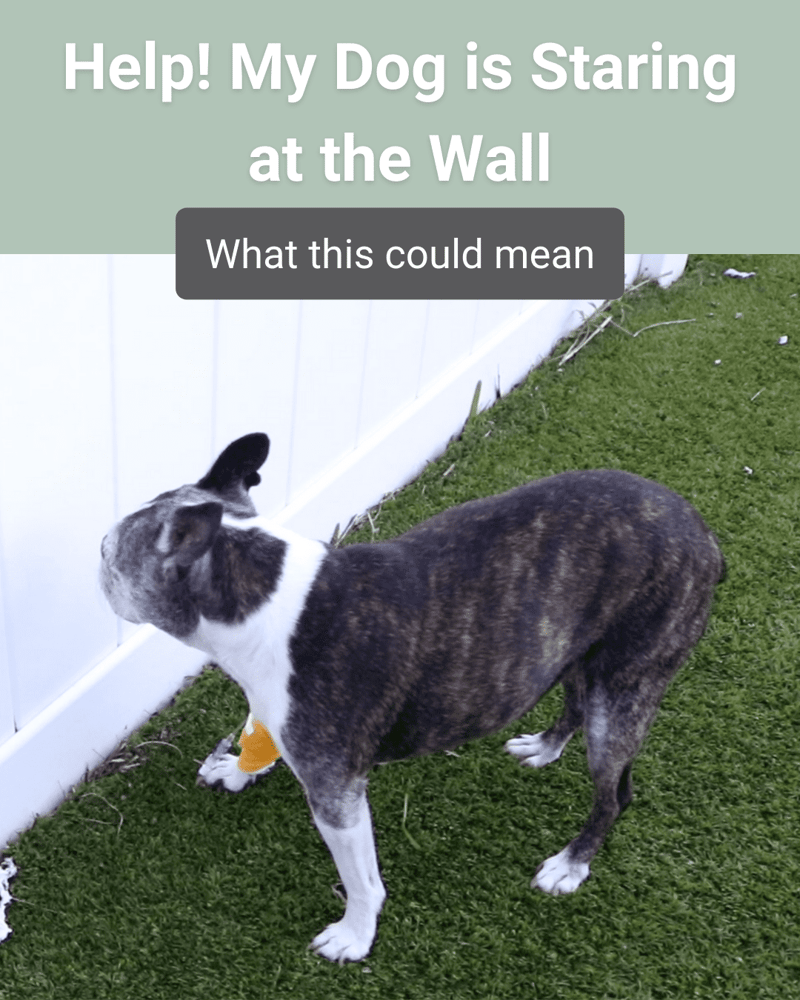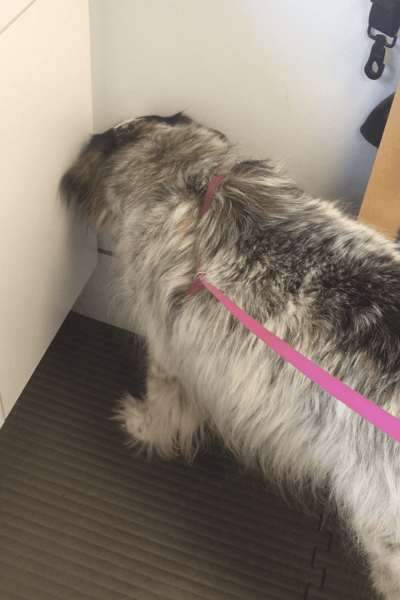Help! My Dog is Staring at the Wall
First thing’s first. Why is your dog staring at the wall? No, your house isn’t haunted. Well, maybe it is, but you’ll have to dive into that topic on a different blog. For now, let’s focus on some of the more likely possibilities.

Common Reasons for a Dog Staring at the Wall
3 of the more common possibilities for your dog staring at the wall include:
Something’s There
Dogs have much more keen senses of hearing and smell than we do. They might actually be listening to or picking up a scent from something on the other side of that wall… or inside the wall. Think rodents, termites, bedbugs (or spirits???)…
However, if this is the case, you will most likely also notice behaviors such as alert ears, head tilting, and sniffing and snorting in addition to your dog staring at the wall. The good news is that this is a problem you can investigate and eradicate by simply calling an exterminator (or maybe a Ghost Buster!!!).
Compulsive Behavior
Just like some people bite their nails or tap their legs, dogs can have physical reactions to psychological distress. Some dogs may even go so far as to develop a condition similar to obsessive-compulsive disorder in humans, resulting in relentless behaviors like tail chasing or paw chewing – or perhaps your dog is staring at the wall.
These behaviors can worsen over time, so it’s important to consult your veterinarian to see what you can do to help your furry friend find a healthier outlet to ease anxiety or release excess energy.
Old Age
If you have a dog in its teenage years, one of the most likely reasons for your dog staring at the wall is Canine Cognitive Dysfunction (CCD). CCD is similar to dementia in people. Having no specific cause, “doggy dementia” is a slow degenerative process that leads to a decline in cognitive function. Diagnosing CCD is typically based on a relatively unremarkable neurological exam, age, history, and reported signs.

In addition to your dog staring at the wall, common signs of Canine Cognitive Dysfunction are:
- Altered sleep/wake cycles
- Disorientation
- Pacing and getting stuck in corners
- Agitation
- Loss of house-training behaviors
- Loss of recognition of known people and pets
- Vocalization/incessant barking
“Treatment for CCD is supportive,” notes Dr. Christine Senneca, neurologist at Southeast Veterinary Neurology. “Some drugs such as selegiline may help, but take time to work, as in weeks to months. Another option, the Purina Neurocare diet, has been specially formulated with high medium chain triglycerides (MCTs), shown to benefit dogs with Canine Cognitive Dysfunction. There are other senior diets on the market that incorporate MCTs as well.”
“Mostly, there is no magic bullet to treat them, and owners just really need to adapt to their pet’s senility the way they would if it were any other member of their family,” Dr. Senneca concludes.
Neurological Reasons for a Dog Staring at the Wall
As far as neurological causes for a dog staring at the wall, Dr. Senneca says, “This is a vague and non-specific clinical sign that can be caused by many problems, both inside and outside of the brain.”

Aside from Canine Cognitive Disorder, some primary neurological possibilities for your dog staring at the wall could be:
Brain Tumors
Brain tumors are one of the most common neurological conditions affecting dogs, especially our older canine companions. A tumor is an uncontrolled growth of cells within tissue. These abnormal cells create masses that destroy healthy tissue.
Stroke
Just like people, dogs can have a stroke when blood flow to part of the brain is obstructed (ischemic stroke) or when a blood vessel bursts (hemorrhagic stroke) and deprives nerve cells and their pathways of oxygen.
Hepatic Encephalopathy
Hepatic encephalopathy is a nervous system condition caused by serious liver disease. When the liver doesn’t function correctly, toxins build up in the blood. These toxins can move to the dog’s brain and affect brain function.
Inflammation
Brain inflammation can be due to infectious causes, but in dogs, it is most often immune-mediated. Inflammation can occur within the brain (encephalitis), within the membranes surrounding the brain (meningitis), or a combination of the two (meningoencephalitis).
What to Do if Your Dog is Staring at the Wall
Because your dog staring at the wall can indicate a serious problem within the brain, you should not ignore this behavior. If you notice your dog staring at the wall for seemingly no reason, especially if it is in combination with any of the following signs, do not delay seeking professional evaluation:
- Changes in behavior
- Walking in circles
- Seizures
- Blindness
- Head pressing

These symptoms are often a sign of forebrain dysfunction. If possible, you should see your veterinarian the same day. After evaluating your dog, if your veterinarian suspects a brain problem, you should be referred to a veterinary neurologist.
If Your Dog Is Staring at the Wall, Southeast Veterinary Neurology Can Help
Advanced diagnostic testing at Southeast Veterinary Neurology can help determine the reason behind your dog staring at the wall. While prognosis depends on the underlying cause, there are medical or surgical treatment options for many conditions that may lead to this behavior. A veterinary neurologist will be able to help you select the best diagnostic and treatment plan for your family.
Southeast Veterinary Neurology has three convenient locations throughout South Florida in Miami, Boynton Beach, and Jupiter, as well as a location in Virginia Beach, VA, each complete with highly skilled veterinary neurologists and state-of-the-art MRI suites. We are open 365 days a year to support your family through canine neurological disease. If your dog is staring at the wall, call any of our locations.